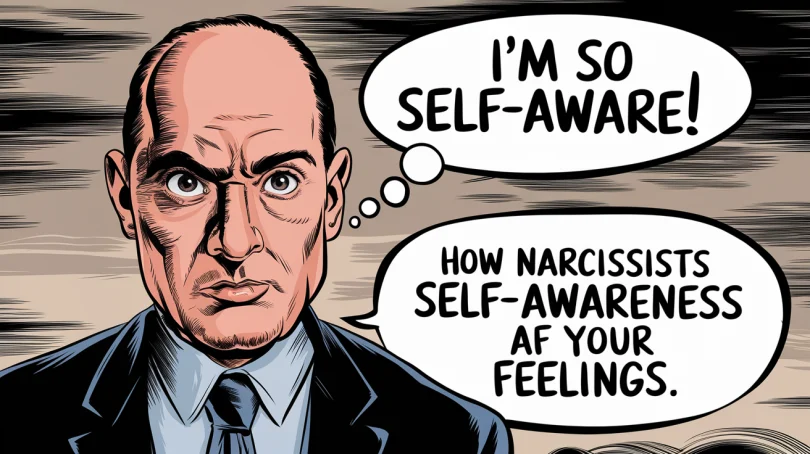Have you ever experienced the narcissist in your life starting to go for counseling, reading self-help books, or even talking about personal growth? For a moment, you think maybe they have finally changed. Maybe things hit a breaking point, a major relationship fell apart, the person got exposed for something they did, or they faced a consequence they couldn’t avoid. Suddenly, the narcissist in your life is talking about healing. They’re acknowledging their past, using words like “growth” and “self-awareness,” and maybe even saying things like, “I know I need to work on myself.”
At first, it feels like progress. It feels like maybe, just maybe, this time will be different. But then you start noticing something: they’re learning the language of healing but not doing the work of healing. Their words sound different, but their behavior is still the same. They’re using new terminology, but the same manipulation is underneath it. They might even admit to some faults, but only in a way that still protects their image.
What’s Happening Here?
So, what is happening here? Why do narcissists work so hard to appear like they’re healing but never actually change? That’s exactly what we’re getting into in today’s article. We’re going to do a deep dive into why some narcissists seem so committed to healing yet rarely ever change. And we’re going to look at a powerful, eye-opening story from the Bible that gives us deep insight into this. So, let’s get into it.
Related Topics:
Tactics NARCISSISTS Use to Confuse Conversations
4 Ways to Torture The Narcissist
Best Responses to a Covert Narcissist’s Emotional Attacks?
10 HARSH Truths About Healing From a Toxic Relationship
Why Narcissists Struggle with Healing
Many people, especially those with narcissistic tendencies, want healing but often only on their terms. They want it to be controllable because they refuse to surrender to a process they can’t dictate. They want it to be as painless as possible because true healing requires humility, and they avoid discomfort at all costs. And they want it to be dignified because anything that threatens their self-image feels like an attack. If healing doesn’t happen the way they expect, they resist it hard or they reject it outright.
This mindset is exactly what almost kept Naaman, the great military commander in the Bible, from receiving his healing. You can read the story in 2 Kings, Chapter 5, but I’m going to paraphrase parts of it for you here.
The Story of Naaman: A Biblical Perspective
Naaman was a powerful man. As the commander of the Syrian army, he had status, influence, and countless victories on the battlefield. But he also had leprosy. Naaman was expecting a healing that was worthy of his status, something grand, something impressive, something fitting for someone of his rank. But when he sought healing from the prophet Elisha, things didn’t go how he imagined.
In fact, Elisha didn’t even come out to meet him. Instead, Elisha sent a servant with a simple, humbling instruction: “Go wash yourself in the Jordan River seven times, and you will be healed.” When Naaman heard this, he was furious. He expected something dramatic, a powerful display, a grand gesture, maybe even a moment where Elisha calls on the name of God and miraculously heals him. Instead, he’s told to go wash in the Jordan river, which wasn’t impressive at all.
Listen to how he reacts:
“I thought he would surely come out to me, stand and call on the name of the Lord his God, wave his hand over the spot, and cure me of my leprosy. Are not the rivers of Damascus better than all the waters of Israel? Couldn’t I wash in them and be cleansed?”
Translation: “This is not how healing should look for someone like me.”
Like many narcissists, Naaman wanted healing but only if it happened on his terms. And his pride almost cost him the very thing he had traveled so far to receive.
Why Do Narcissists Struggle with Healing?
So, let’s keep going with the article. Why do narcissists struggle so much with healing? The answer lies in three key issues:
1. They Reject the Person God Uses to Bring Healing
Pride doesn’t just make someone think they’re better than others; it makes them incapable of receiving wisdom from anyone they don’t see as their equal or superior. And that’s why narcissists reject correction, even when it’s filled with truth and love.
Look at Naaman. His first offense wasn’t the instructions he was given; it was who delivered them. Elisha, the great prophet that Naaman traveled all this way to see, didn’t even come out to greet him. Instead, he sent a servant with the message. To a man of Naaman’s rank, this felt like an insult.
Narcissists are the same way. They will only listen to voices they deem worthy someone with status, a respected expert, or a person who validates their image. But if the truth comes from you, their spouse, a friend, or even their child, it’s dismissed. This is why trying to reason with a narcissist can feel pointless. It’s not that you lack wisdom; it’s that they don’t believe wisdom can come from you.
2. They Don’t Want to Change; They Just Want to Eliminate Discomfort
Narcissists are goal-oriented when it comes to healing, but their goal isn’t wholeness; it’s control. This is exactly why so many narcissists will go to counseling or therapy, but only if they get to control the process. The moment the counselor challenges them, they quit. If counseling takes longer than they think it should, they declare it useless. If the therapist doesn’t shower them with praise for all their “progress,” they fire them. If they’re not getting the result they want, like winning back a spouse or getting admiration from others, they’ll say that counseling or therapy doesn’t work.
The reality is that narcissists aren’t looking for healing; they’re looking for reinforcement of their reality. a narcissist’s life, the way they operate, is like a carefully constructed rock garden. But instead of soft soil, it’s filled with massive, immovable boulders: entitlement (“I deserve special treatment”), grandiosity (“I am above others”), avoiding responsibility (“Nothing is ever my fault”), the need for control (“I dictate the terms of everything”), and fear of vulnerability (“I can’t afford to be weak”).
These aren’t just behaviors; these are the very foundation of how a narcissist operates. Now, they may recognize that some of their behaviors cause problems, but at their core, they believe these traits protect them. And if they were to remove these boulders, it would feel like annihilation because beneath them, they fear that there is nothing left.
So, when a narcissist says they’re “working on themselves,” what do they actually do? They pull weeds. They tweak small behaviors that don’t threaten their core identity. They might work on their temper to seem more in control. They might improve their social skills to gain more admiration. They might even talk about self-awareness and personal growth. And some will even go further; they may plant flowers. They may give to charity or talk about being a better person, maybe quoting scripture or self-help books. But the boulders? They stay untouched.
Because real healing requires surrender. If a counselor, a spouse, or a friend suggests real change like developing true humility, taking full accountability, making restitution, or serving without expecting something in return, the narcissist will resist or abandon the process altogether. Because to them, healing feels like destruction. It would mean confronting what lies beneath the boulders, the very thing they’ve spent their entire lives avoiding: their deep-seated insecurity, their shame, and their inability to form real emotional connections.
3. They Fear What Lies Beneath the Surface
Naaman almost missed his healing for the same reason narcissists do. He wanted Elisha to simply wave his hand over him and fix everything no effort, no humility, no obedience. But healing required action action that made Naaman uncomfortable.
If you’ve spent years hoping a narcissistic loved one would change, it might be time to ask yourself: Are they truly seeking healing, or are they just looking for a way to regain control over their circumstances? Do they actually want transformation, or are they only willing to change if it lets them maintain their image and avoid real vulnerability?
Narcissists may say they want to grow, but growth on their terms usually means reinforcing their existing worldview, not confronting what’s broken. Keeping control of the process does not allow real accountability. Tweaking behaviors but avoiding deep internal change. And that’s why they don’t truly heal.
Real Transformation Requires Humility
Naaman only received healing when he was willing to surrender not just to the process but to the truth that his way wasn’t the only way. Until he humbled himself and obeyed, his healing remained out of reach. The same is true for narcissists. Until they are willing to let go of control, they will never change.
If you’ve been holding on to the hope that a narcissistic loved one will one day see the truth and change, it’s time to step back and ask yourself: What has their pattern shown you? Real transformation requires humility, self-examination, and a willingness to let go of control. But if someone is only willing to pursue healing in ways that preserve their self-image, keep them in control of the process, and allow them to maintain their authority, then they’re not seeking healing at all. They’re seeking a way to avoid real accountability.
Your Healing Starts with You
I know that this could be painful to accept, but the reality is that many narcissists will never choose the path of real transformation because, to them, true change would mean dismantling the very defenses they’ve built their lives around. So, instead, they talk about change, perform self-improvement, and even convince themselves they are growing as long as the process never requires them to face what’s buried beneath the surface.
Here’s what I want you to hear: You don’t have to stay stuck. Naaman’s healing was right there, available to him, but first, he had to let go of his entitlement, his pride, and his expectations about how healing should look. And in the same way, your healing is available for you, too. But it starts when you stop waiting for your narcissist to change, and it starts with choosing freedom for yourself.
The truth is, you can’t make a narcissist surrender, but you can refuse to surrender to the illusion that they will.






